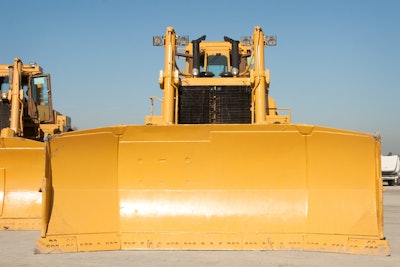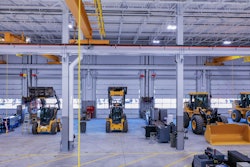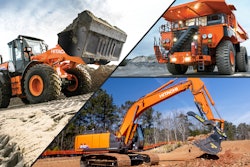
One effect of the pandemic and supply chain slowdown has been the surge in popularity of used construction equipment. In short, demand has never been higher.
Across the board, auctioneers and used equipment dealers are posting record sales and revenues. For example, BigIron Auctions reported sales 50% higher than the prior December auctions, which included the sale of agriculture, construction and transportation equipment.
“The used equipment market is hot right now due to the lack of supply from manufacturers,” explained BigIron CEO Mark Stock.
Also notable is companies venturing into used equipment for the first time. Bryce Puckett, general manager of rental at Kirby-Smith Machinery, has stated, “For the first time, we have bought off-lease equipment from our manufacturers and customers. We are actively buying used equipment to put into the rental fleet.”
But this increase in popularity also brings an increase in the biggest issue in used equipment sales: a clear title. And it can affect both buyers and sellers.
Be aware of possible title issues
The bottom line in any used equipment transaction is that the machinery should have a clear title free of liens, and a UCC search should come up clean.
The problem is there are no guarantees with UCC searches, especially once any piece of equipment has gone through several owners. As the number of former owners goes up, the likelihood of there being a lien on the equipment increases. This is because not all liens are “directly” tied to the equipment.
For example, if a construction company takes out a bank loan, the bank will usually put a blanket lien on the entire business, meaning every piece of equipment it owns is covered (i.e. “blanketed”) under this lien. But this often gets forgotten.
In many cases, a forgotten lien remains just that: forgotten. But the bottom line is the law almost always favors the lienholder. Every year, companies lose equipment once the rightful lien-holder maked a claim. What makes this worse is the buyer may have no recourse. Since it’s always a financial issue that causes a lien-holder to emerge, getting one’s money back could be problematic, especially if the equipment was purchased from a private seller who is having said financial issues.
So how can a company alleviate this? While nothing is guaranteed, there are steps buyers can take to be reasonably sure they are protected, and also steps sellers can take to alleviate buyers’ fears.
Clear title tips for buyers and sellers
For buyers, the easiest way to get peace of mind is to buy from a reputable, longstanding dealer who will stand behind their equipment. Prolific and successful dealers are typically diligent in ensuring everything they sell has a clear title, and in the off chance there is an issue, they will stand behind it.
However, many used equipment purchases are made from private sellers. In this case, it’s caveat emptor – buyer beware. Sellers that provides paperwork showing they are the original owners can help, and having a lien release from any loans helps too.
In the absence of the seller being the original owner, a clear paper trail and any lien releases back to the first owner are desirable. But again, as the number of former owners increases, the likelihood of an issue increases as well.
In the end, for a private sale, it comes down to trust – the buyer is going to have to trust the seller.
For sellers, they can make buyers feel more comfortable by documenting everything and showing a clear paper trail back to the original purchase. Lacking this, demonstrating they’ve owned the equipment for “x” years without issue may help. (If a seller owned a backhoe for a decade without incident, that might make a buyer feel more comfortable.)
Wrapping up
The preceding is not meant to frighten anyone from purchasing used heavy equipment. However, when purchasing any piece of used equipment, the “clear title” aspect should be at least discussed with the seller, and the buyer should be comfortable with the entire transaction.
As stated earlier, the best way to feel comfortable is to buy from a reputable dealer that will stand behind the goods regarding clear title and old liens. In the case of a private sale, it’s trickier, but asking good questions and insisting on past owner/lien release paperwork can go a long way in mitigating risk.
But always understand that in any UCC search, nothing is 100% guaranteed. It’s more about being aware of the risks and taking the best steps to lessen them.
Chris Fletcher is the vice president of National Accounts at Crest Capital, which offers small and mid-sized companies financing for new and used equipment, vehicles and software, as well as offering equipment sellers a financing program. Visit them online at www.crestcapital.com
All views expressed in this article are those of the author and do not necessarily represent the policy or position of Crest Capital and its affiliates.











